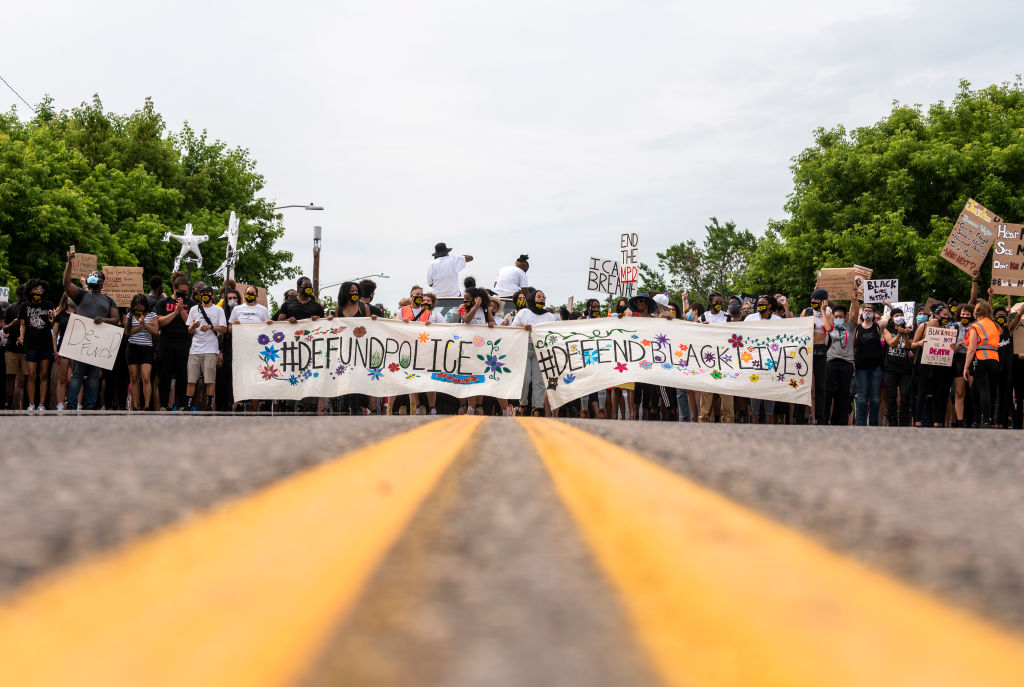Thanks to the nature of digital media, the last 10 days can be seen in entirely different ways. On one feed rioters turn urban centers into scenes from a Purge movie, indiscriminately attacking people and property, advancing the cause of racial justice by burning down immigrant-run businesses and murdering a retired black police captain.
On another feed, it is the cops who are running amok. Festooned with tactical gear and high-tech weaponry (or old-fashioned clubs), the police appear to attack people indiscriminately — from old men to young women out buying groceries to homeless guys in wheelchairs — apparently for the crime of being in their way.
If the protests have a message besides ‘Black Lives Matter’, one that is heard by everyone, regardless of how they interact with the media, it is that the police must be defunded or abolished entirely.
Abolishing the police has become a rallying cry for protesters in the street and their backers online. The instinct of many conservatives has been to scoff at the notion, or laugh at its preposterousness, as Megyn Kelly did when she was confronted with the idea at a Fox News town hall four years ago.
Many Americans, let alone conservatives, would probably have scoffed at Mariame Kaba until a few weeks ago. An activist and organizer, Kaba is representative of the theorists who have been laying the groundwork for police abolition for years. In Chicago, where she arrived for graduate school in 1995, Kaba was the leading voice of the abolition movement there for over two decades. She told an interviewer that when she first arrived ‘there were no abolitionist organizations in the city’. By the early 2000s, Incite! an activist group founded by Kaba, began to host national conferences that brought together intellectuals and organizers — including Angela Davis — to work out what abolitionist ideas would mean in practice. Kaba wants both police and prisons abolished. ‘Abolition is not about changing one thing,’ she says. ‘It’s about changing everything, together.’
Why focus on Kaba, who appears to have walked, fully-formed, out of the pages of a Tom Wolfe novel? It’s because ideas that activists like her have been producing are the ones being picked up by the Atlantic, the New York Times, Vox and TIME magazine, in the wake of George Floyd’s killing. What would Kaba’s post-prison, post-cop world look like? Kaba advocates restorative justice. She explained the idea to Chris Hayes last year:
‘It’s a very different model than the adversarial system that we currently have where harms occur and the state intervenes. In this case, the idea is that you have a community of people who will intervene and so they ask usually a set of questions… Because the idea of restorative justice is that harms engenders needs and that those needs should be met. And the issue is who’s going to meet the needs and how will people meet those needs?’
Clear now? Restorative justice draws on pre modern conceptions of conflict resolution — such as peace circles — as an alternative to police and prisons. Kaba argues that the latter are not only corrupted by systemic racism, but that they are actually unnatural, a kind of historical accident. Indigenous people didn’t need police, Kaba says, so why do we?
These ideas have been taken up rapidly during the protests. Under the headline ‘No More Money For the Police’, two writers in the Times envision the replacement of cops with ‘health care workers or emergency response teams’, ‘rapid response social workers’, ‘conflict interrupters and restorative justice teams’ and ‘community organizers’. Writing for TIME, Minneapolis City Council member Steve Fletcher believes that the police must be disbanded. ‘We can invest in cultural competency and mental health training, de-escalation and conflict resolution.’ Fellow council member Jeremiah Ellison tweeted: ‘We are going to dismantle the Minneapolis Police Department. And when we’re done, we’re not simply going to glue it back together. We are going to dramatically rethink how we approach public safety and emergency response.’ In New York and LA, cuts to policing budgets have already been announced. Meanwhile memes proliferate that show police abolition as the newest frontier in the struggle that rid the world of slavery, then segregation. The moral arc of the universe is long, but it bends towards peace circles.
Like Kaba, nobody writing these op-eds wonders whether a cop-less world would leave the poor with the Mafia and the rich with Blackwater, as Michael Brendan Dougherty put it. They think that without police, America will enthusiastically take up community justice along ancient indigenous lines, rather than slide back to the communal vigilantism.
Advocates of abolition, like advocates of the Green New Deal, are not interested in incremental change. Abolition is more dramatic than that. Alex Vitale, author of The End of Policing told Mother Jones that abolition ‘goes hand in hand with decriminalizing sex work, drugs, homelessness, mental illness. We don’t really need a vice unit, we need a system of legalized sex work that’s regulated just like any other business.’
The abolitionist focus is always on systems. Bad cops are not bad apples, they are the rotten fruit of a blight-ridden orchard. As Ta-Nehisi Coates wrote in 2015: ‘A reform that begins with the officer on the beat is not reform at all. It’s avoidance. It’s a continuance of the American preference for considering the actions of bad individuals, as opposed to the function and intention of systems.’ The abolition of the police is merely one demand on the laundry list. The Minneapolis abolition group MPD150 is typical in this respect. After abolition comes everything else:
‘Dismantling the police will require reallocating their budget and assets to support real solutions to community desperation: good, well-paying jobs, affordable housing, healthy food, empowering education, accessible health care, removal of toxins, etc. Ending the brutal police system is, by necessity, a program for a more just and resilient city.’
It is worth giving abolitionists a hearing. It is also worth asking them questions, getting them to be specific and detailed about their stated goals. Exactly how will restorative justice work in practice? How would it solve a homicide? How would it deal with gangs and human traffickers and drug dealers? Why would this be an improvement on current policing methods? Who will pay for the full suite of reforms? How could they fail? Is the system really so corrupt that it must be burned down before anything else can happen? How can you guarantee that there wouldn’t be a nationwide version of the Ferguson or Baltimore effec
[special_offer]
In an election year the most salient question of all is: who would vote for this? A slogan like ‘Abolish The Police’ seems guaranteed to inspire revulsion among the public, even if sections of the media push it from now until November. Most Americans want some measure of police reform — less violence, more body cameras — but they do not support reducing police budgets, let alone abolishing the police altogether. Voters who backed Obama in 2012 who then switched to Trump in 2016 want to see more police officers hired, as do African Amercians.
Every top-ranking Democrat is shortly going to find themselves in the position of Minneapolis Mayor Jacob Frey. Attending a rally yesterday, Frey gave a short speech about systemic racism. He muttered some other Obama-era talking points. Nobody was satisfied. Asked by protesters if he supported defunding the police department, Frey bravely said he did not. He walked away as a crowd of thousands booed, pursued by chants of SHAME! SHAME! SHAME!
Joe Biden is going to face that question sooner rather than later. If he does what Frey did he’s going to anger a lot of people he needs to turn out in November. If he says yes — defund, then abolish the police, replace them with peace circles — he’s going to hand Donald Trump far more votes than he deserves after the madness of this year.


















